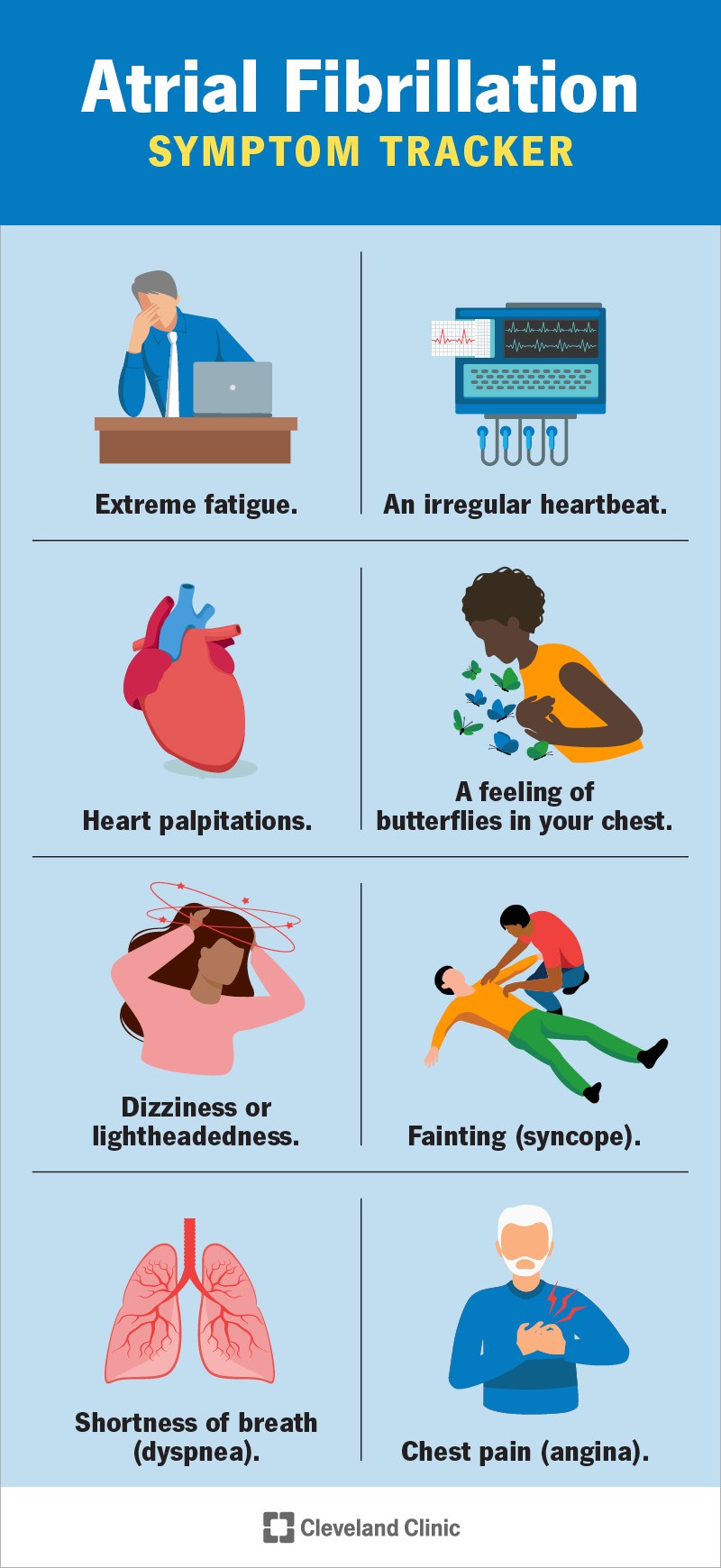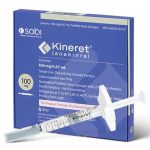
Contents
- 1 Atrial Fibrillation (AFib) Symptoms and Signs
- 1.0.1 What are atrial fibrillation symptoms and signs?
- 1.0.2 What does atrial fibrillation feel like?
- 1.0.3 Do all types of atrial fibrillation have the same symptoms?
- 1.0.4 Who is at risk for atrial fibrillation?
- 1.0.5 Are heart attack or stroke symptoms different from atrial fibrillation symptoms?
- 1.0.6 What is the treatment for atrial fibrillation symptoms?
- 1.0.7 What is the prognosis and life expectancy for a person with atrial fibrillation?
Atrial Fibrillation (AFib) Symptoms and Signs
Atrial fibrillation (AFib, AF) is a disturbance of the rhythm of the heartbeat (arrhythmia), a type of heart rhythm disorder.
To understand how atrial fibrillation occurs, let’s first understand the normal rhythm of the heart and how the electrical activation of a heartbeat occurs. In a person with a healthy heart, the rhythm of the heartbeat is initiated by electrical activation of the natural pacemaker of the heart, the sinoatrial node (SA node). From there, the electrical activity spreads along natural pathways through the two chambers of the top of the heart (atria), then to the ventricles that pump the blood out into the circulation. The uniform contraction of the atrium generated by the electrical stimulation of the heart muscle causes the atrium to contract, passing blood into the ventricle where it can be pumped out into the circulation.
AFib occurs when the top chambers of the heart fire with electrical activity completely chaotic throughout the atrium, without really forming a uniformly contracting atrium to pass blood down into the ventricles. The random electrical activity throughout the atrium connects randomly to the ventricle. This leads to an irregular heart rhythm of this condition. AFib can cause the ventricle to contract irregularly at rates ranging from 100 to 200 beats per minute.
The irregularity of the heart contractions in AFib account for all of the symptoms caused by the disease. This is a type of heart disease.
What are atrial fibrillation symptoms and signs?
Very often, people with AFib have no signs or symptoms and do not know they are in atrial fibrillation. Those who notice when they are having atrial fibrillation can have signs and symptoms ranging from mild to debilitating.
Symptoms of this heart condition include:
- Rapid beating, pounding, or fluttering sensation in the chest (palpitations)
- Lightheadedness
- Dizziness
- Weakness
- Shortness of breath
- Uneasy feeling
- Fainting
- Fatigue
- Awakening from sleep
- Anxiousness
- Difficulty walking
- Chest discomfort or pain
What does atrial fibrillation feel like?
A person with atrial fibrillation that causes no symptoms may not experience abnormal feelings or sensations. However, when symptoms and signs of this heart disease are present, one of the most common symptoms is a feeling of the heart beating rapidly. It can also feel like the heart is fluttering in the chest with palpitations as the heart beats irregularly. Because the chambers of the heart are beating irregularly, they do not adequately fill with blood before contracting. This causes insufficient oxygen distribution throughout the body, leading to:
- Lightheadedness and dizziness, which may cause the person to fall from near fainting when upright
- A general sensation of leg weakness and overall uneasiness
- Overall fatigue commonly associated with shortness of breath
- Difficulty with movement, such as ascending stairs or walking uphill, and chest discomfort
- Sweating and a feeling of unwellness
Some people with early atrial fibrillation may have minimal symptoms. Often, it is short-lived and the normal heart rhythm is restored. Later, this heart condition can occur more frequently and for a longer duration of each episode. This is when the signs and symptoms the person may be experiencing can be more pronounced, and treatment may be necessary.
Do all types of atrial fibrillation have the same symptoms?
Atrial fibrillation can be categorized as paroxysmal, persistent, or permanent.
- Paroxysmal atrial fibrillation occurs in random episodes and does not persist but spontaneously returns to normal heart rhythm after the episode (it comes and goes). Paroxysmal fibrillation symptoms include sudden onset of fluttering in the chest, shortness of breath, or chest discomfort when atrial fibrillation begins. This can be associated with rapid onset fatigue and weakness. It can awaken the person from sleep with sweating and anxiousness.
- Persistent atrial fibrillation is AFib that once initiated continues without spontaneously reverting to normal heart rhythm. Persistent AFib resolves only with chemical or electrical cardioversion. Persistent atrial fibrillation symptoms are identical to those of paroxysmal atrial fibrillation except that they do not spontaneously resolve.
- Permanent atrial fibrillation: Sometimes, the heart rhythm of persistent atrial fibrillation cannot be converted to normal rhythm by cardioversion methods or the cardioversion is not sustained. In this situation, medications are used to slow the rapid heart rhythm so the heart can pump more efficiently and symptoms can be reduced. Permanent atrial fibrillation symptoms are typically less intense than those of paroxysmal or persistent atrial fibrillation as the rate of ventricular beating is slowed by drugs.
QUESTION
Who is at risk for atrial fibrillation?
Several risk factors for this condition include coronary heart disease, hypertension (high blood pressure), blood clot in the lung (pulmonary embolism), heart failure, chronic lung diseases such as chronic obstructive pulmonary disease (COPD), emphysema, and asthma, excessive alcohol intake, stimulant drug use such as cocaine or decongestants, recent heart or lung surgery, and congenital heart disease.
Are heart attack or stroke symptoms different from atrial fibrillation symptoms?
A person that has chest discomfort or pain with AFib could be having a heart attack. It is not possible to distinguish the cause of the chest discomfort or pain without a complete medical evaluation, including an electrocardiogram (EKG, ECG).
Atrial fibrillation can lead to stroke from a blood clot in the heart dislodging and going to the brain. Four signs of stroke include:
- Sudden onset slurring of speech
- Face drooping
- Drooling
- Weakness or numbness in an extremity
AFib, stroke, and heart attack are medical emergencies, and the person who is ill should be seen by a doctor for treatment immediately.
What is the treatment for atrial fibrillation symptoms?
Treatment and management of symptoms of atrial fibrillation involve either restoring the abnormal heart rhythm back to normal or controlling the abnormally fast rate.
To restore the heart rhythm to normal, sometimes drugs are used intravenously to convert the rhythm from AFib to normal sinus rhythm. There are many drugs and medical procedures that are effective for eliminating and preventing AFib. Alternatively, electroshock pulse to the chest and heart can reset the heart rhythm to normal, and there are surgical interventions such as cardiac ablations and Maze procedures (a type of ablation) that can permanently correct this disease. The treating doctor will advise the best option for each individual as the ideal option varies from patient to patient.
A variety of drugs can be used to decrease the electrical excitability of the heart in atrial fibrillation or limit the transmission of chaotic electrical impulses that reach the ventricles. Both are used to achieve a slower and more efficient heartbeat.
Medications referred to as "blood thinners" are frequently used for the treatment and management of AFib to prevent blood from clotting in the atria, which can lead to stroke. These include warfarin (Coumadin, Jantoven) and newer anticoagulants. Anticoagulants are often used for several weeks to minimize the risk of stroke. Drugs are used to slow the heart rate until the blood is adequately thinned. Simple aspirin is not adequate as a blood thinner for AFib.
When should you see your doctor for atrial fibrillation?
Atrial fibrillation is a health condition that a doctor should evaluate and diagnose. A patient should discuss their treatment plan with a doctor or other health care professional.
If you or someone you know experiences signs and symptoms of AFib, stroke, heart failure, or heart attack, seek immediate medical care from a doctor, urgent care, or emergency room facility.
What is the prognosis and life expectancy for a person with atrial fibrillation?
A person with this type of heart disease can live a normal, active life as long as they continue to receive ongoing medical treatment.


